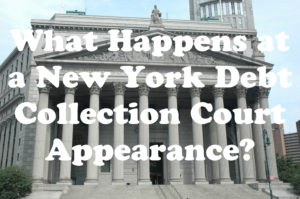By: Robert J. Nahoum
You’ve been served was a summons and complaint or discovered that you have a default judgment entered against you. It’s a debt collector suing you on an old credit card or medical debt.  You’ve done your homework on the internet and realized that you can’t simply ignore the case as that will only make things worse. You’ve filed your answer or your order to show cause and have now been notified that you must appear in court. What should you expect at the court appearance?
In debt collection cases, court appearances are scheduled for a variety of reasons. Anytime a motion is made, either by you or the debt collection attorney, you will need to go. A motion is an application to the court seeking some form of relief. For example, during the discovery stage of the case, you may ask a debt collector to produce a copy of the credit agreement they sued you on. If the debt collector refuses to produce the agreement, you may want a judge to order them to produce it. For this, you will need to make a motion and go to court.
Court appearances are also scheduled for court conferences. The first purpose of a court conference is to get the two sides together and explore whether a settlement is possible. Depending on the court, this is sometimes done with through mediation with the court attorney while other times it is just an informal conversation in the hallway with the debt collection lawyer.  Court conferences are also used to plan litigation schedules and to discuss trial issues.
Court appearances are also schedule for trials.  Trials are where both sides get to put their evidence before the court and have a determination made of who wins and who loses.  In debt collection cases, it is always the Plaintiff’s burden to prove that the consumer is responsible for the debt. To meet this burden, the Plaintiff must prove that: (1) it has the right to sue you; (2) the debt is yours; and (3) you owe the amount for which you were sued. It is never the burden of the consumer to prove that he or she does not owe the debt.
To meet its burden, the proof submitted by the Plaintiff must be based on “personal knowledgeâ€. Personal knowledge means that the person offering the evidence on behalf of the Plaintiff must be a witness to the event shown in a particular document. For example, if credit card bills are offered into evidence on behalf of the Plaintiff, the person offering the evidence must have personal knowledge of how the information in the credit card bill got there, how it is generated and how it is maintained. That person must have personal knowledge of the computer system and how it operates. If this person does not have such personal knowledge, the evidence is “hearsay†and it cannot be used.
A word of caution, for a variety of reasons court dates are routinely “adjournedâ€. “Adjourned†simply means that the court date is put off to a later date. Because court dates are so often adjourned, especially in the debt collection courts, court appearances can sometimes take 2, 3 and sometimes even more trips to the court.
If you need help settling or defending a debt collection lawsuit, stopping harassing debt collectors or suing a debt collector, contact us today to see what we can do for you.
The Law Offices of Robert J. Nahoum, P.C
(845) 232-0202
www.nahoumlaw.com

